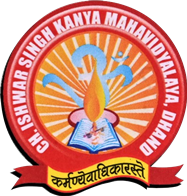Ch. Ishwar Singh Kanya Mahavidyalaya
CODE OF CONDUCT
Code of Conduct contains a set of rules and general guidelines that outline the expected behaviour and conduct from its different stakeholders to promote quality education in the college. Conduct of Principal, faculty, staff and students should take the college towards greater heights. Everyone in the college should maintain a positive and respectful work environment to ensure professionalism. Our aim should be to promote safe, congenial and inclusive college experience. This document outlines values, principles and standards of behaviour that are envisioned for maintaining a safe, respectful and inclusive learning environment. This set of do’s and don’ts provides a road map of actions and it is expected from all concerned to be mindful of their conduct and work towards achievement of vision and mission of the college.
Policy on Code of Conduct
Code of Conduct for Governing Body
Governing Body members should follow the following code of conduct to maintain the highest standards of integrity, respect and accountability to ensure effective governance for the college:
- Integrity: Act with honesty, transparency and integrity in all decision-making processes.
- Respect: Foster an inclusive and respectful environment for fellow governing body members, Principal, Faculty, Staff and students.
- Confidentiality: Maintain confidentiality of sensitive information, discussions and personal information.
- Accountability: Take responsibility for actions, decisions, performance and outcomes.
- Objectivity: Make decisions based on objective criteria, avoid personal agendas
- Communication: Communicate effectively and respectfully with stakeholders. Ensure transparent communication channels.
- Governance: Ensure effective governance and leadership.
- Conflict Resolution: Ensure fair and transparent conflict resolution processes.
Code of Conduct for Principal
Principal of the college should follow the code of conduct to demonstrate her commitment to ethical leadership, academic excellence and the well-being of students, faculty and staff members:
- Integrity and Honesty: Act with integrity and honesty in all professional interactions.
- Confidentiality: Maintain confidentiality and handle sensitive information with discretion.
- Transparency: Ensure transparency in decision-making processes with clear and timely information to the stakeholders.
- Respect and Empathy: Treat students, teachers and staff with respect and empathy and provide supportive culture.
- Fairness and Impartiality: Make decisions based on impartial and fair criteria.
- Professional Development: Stay updated on best practices in education.
- Student well-being: Support students’ academic, extra-curricular development and emotional growth by prioritizing their well-being and safety.
- Collaboration: Foster collaboration among teachers, staff and students.
Code of Conduct for Teachers
Faculty members should maintain the highest standards of professionalism, respect and integrity ensuring a positive and effective learning environment for all the students.
- Professionalism: Maintain a professional attitude and demeanour at all times by upholding highest standards of teaching and learning.
- Respect: Treat students, parents, colleagues, staff with respect and dignity.
- Integrity: Act with honesty and integrity in all interactions
- Confidentiality: Maintain confidentiality of student information and record.
- Objectivity: Make Decisions based on objective criteria and evidence. Avoid bias and personal agendas.
- Communication: Communicate effectively and respectfully with students and colleagues.
- Continuous Improvement: Engage in professional development by attending conferences, workshops, seminars and publishing research papers.
- Classroom Management: Maintain a safe and respectful learning environment.
Code of Conduct for Staff
- Respect: Treat students, Faculty, colleagues, visitors and guests with respect.
- Team Work: Collaborate with colleagues to achieve common goals.
- Accountability: Be accountable for your own work and performance.
- Efficiency: Maximize your efficiency. Finish your work in time.
- Stakeholder Service: Provide excellent services to all the stakeholders. Respond to queries and concerns in a timely and respectful manner.
- Data Protection: Maintain confidentiality of college data. Ensure secure storage and disposal of personal data.
- Security: Care for college property.
- Integrity: Refrain from accepting bribes or indulging in corrupt practices.
- Congenial Environment: Facilitate a congenial environment. Stay away from any form of discrimination.
Code of Conduct for Students
- Respect: Respect Indian Flag and National Anthem. Treat Everyone with respect and dignity. Don’t bully or harass your fellows. Use respectful language and tone.
- Academic Integrity: Maintain honesty in academics. No cheating or falsification.
- Attendance and Punctuality: Attend classes regularly and arrive on time. Don’t be absent from the classes if you are in college campus.
- Property and Facilities: Respect college property, books and facilities. No vandalism, theft or damage to college property.
- Inclusivity and Diversity: Embrace diversity and inclusivity. Don’t discriminate on any basis.
- Discipline: Maintain discipline in college campus and functions. Participate in college events respectfully. Don’t stick any notice on the notice board. Keep your vehicles in parking area only.
- Library Visit: Visit library in free time. Spend time in reading books of your interest.
- Cleanliness: Keep the campus and class rooms neat and clean. Don’t litter here and there. Use bins.
- Environmental Consciousness: Don’t pluck flowers. Damaging plants is strictly prohibited.
- Safety and Security: Follow college safety and security protocols.
- Accountability: Be accountable for your own learning and behaviour. Take responsibility for your actions.
- Social Media: Use social media responsibly.
- Substance abuse: No possession or use of illegal substances.
- Guest Policy: Take permission of Principal before inviting or meeting any guest.
- Reporting Incidents: Report incidents of fights and ragging, if any to the Internal Complaint Committee and anti ragging committee respectively.
